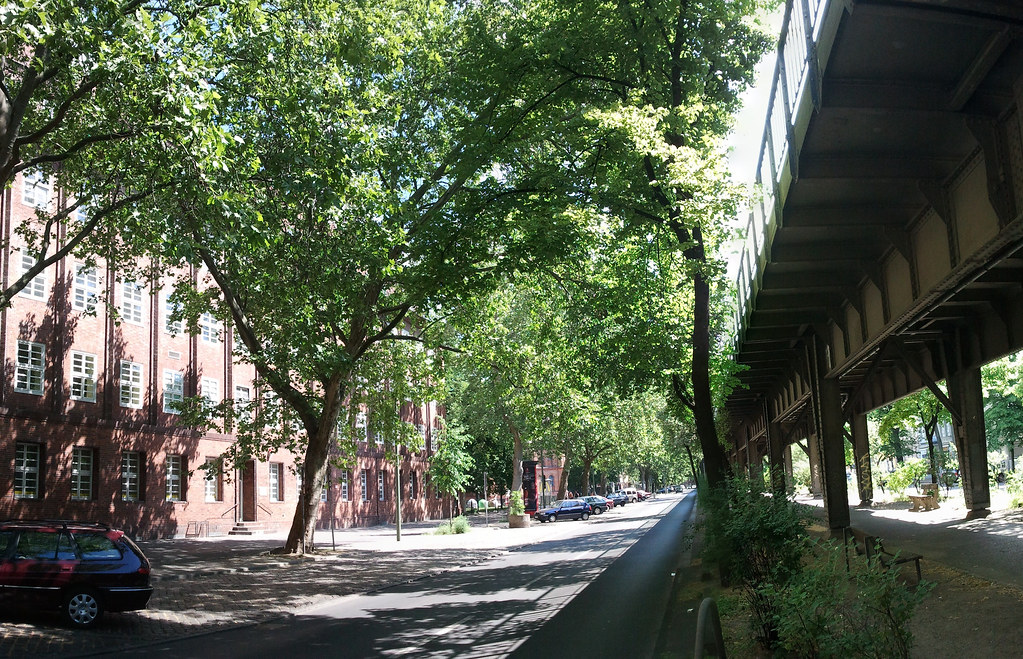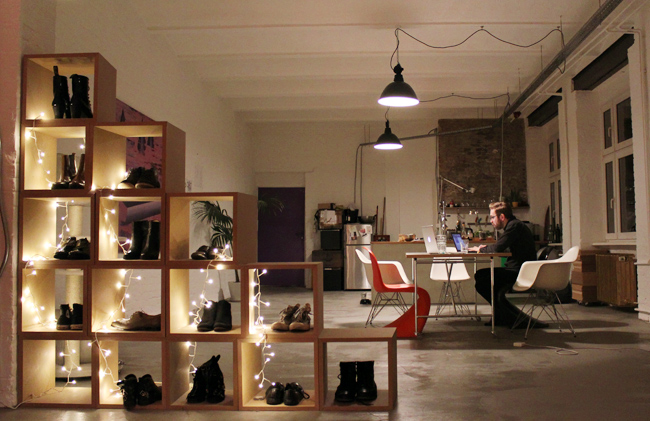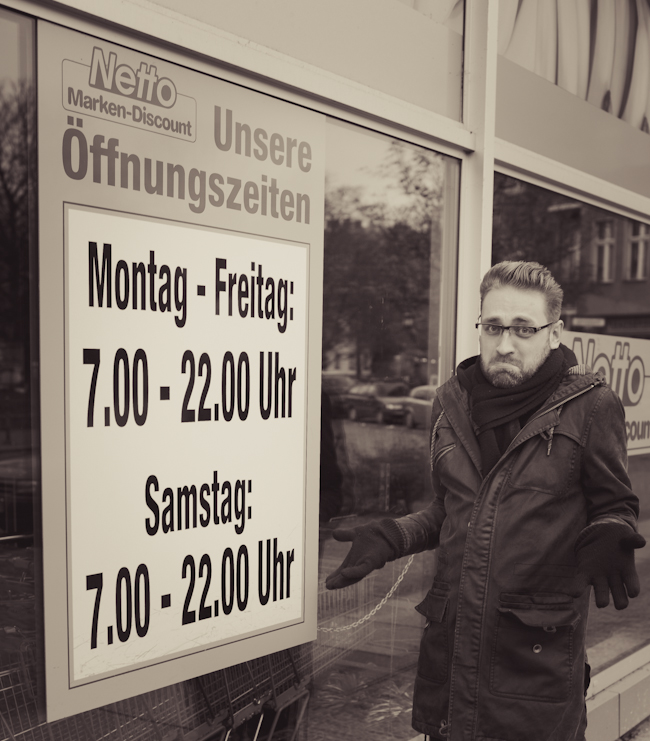Adam Fletcher is the author of a Picnic for Perverts a book neither about picnics or perverts. He is also the creator of Berlin Bingo, an amusing guide to Berlin made up of 64 city challenges.
Let me start by saying, Berlin’s ego is big enough already. It’s like the goofy, nerdy girl from the rom-com who let her hair down and took her glasses off some time back in 2005 and everyone collectively gasped, “Berlin – you’re hot!” Once we found out she was also cheap, that really sealed the deal – and naturally many of us flocked here to try and make lives for ourselves, which makes the idea of being a “real Berliner” a particularly challenging proposition in a city of such constant reinvention.
With all that in mind, I’ve still done my best to collate a list of 11 signs you’ve become a Berliner, which I hope most of us, despite our greatly varying backgrounds, can agree on.
1. You only have two moods, winter (sad) and summer (happy).

It can be challenging navigating the spectrum of all possible human emotions. Quite time consuming even, all that working out how you’re really feeling. True Berliners have simplified down all that emotional complexity to just two basic binary moods – happy and sad. Sad occurs during the horrible, long Berlin winter, in which we all struggle to remember, why did we move here? Happy occurs during summer, when everything is just damn peachy.
2. You’ve viewed a flat with 60 other people.
I know someone who moved to Berlin seven years ago. He laughed, telling me how easy it was to get an apartment in Neukölln then. He said you went to a real estate agent, who gave you a big set of keys and a map before you took yourself round to look at the apartments. He even slept in some over-night, to check the neighbours and noise levels and all that good stuff. When I moved here with my girlfriend, some three years ago, it was already chaos. We never saw an apartment on our own, rarely with less than 40 other people. Everyone carried this big “please pick me” pack containing credit reports, references, employment contracts, begging letters, an essay they wrote when they were seven about a particularly enjoyable summer holiday – anything they thought might help. We didn’t even really look at the apartments – we fought our way up the stairs, barged through the door and with single-minded determination headed straight for the agent, laid the charm on thick, proclaimed our love for the place, told a joke or two, tried to be memorable, gave him the pack, shook hands, and left. Next Besichtigung. Hustle, hustle.
We viewed more than thirty apartments, said yes to twenty five, got offered one. Accepted it. I don’t even remember viewing it. I thought we were moving into another apartment, and when we arrived I was convinced they gave us the wrong one. Now, three years later, I don’t even want to imagine how bad flat hunting has got. I assume they just give you a piece of paper with an outline of the human body on it and you mark what organs you are willing to trade for a Zweiraumwohnung out in the ass end of nowhere, also known as the Ringbahn.
3. You’ve danced at a U-Bahn station.

I’ve never understood people having sex in toilets. I get that they are there and sort of semi-private. Or at least they have a door even if it doesn’t always reach to the floor. Yeah, I’m showing my age here, I know. But that’s a place in which people defecate and put up stickers promoting their startup. Presumably you have a bed. Go there.
So it’s with the same confusion that I disembark the U1 at Schlesi on my way home some weekend nights, only to be greeted by a popup club blocking all the exits. We have places for that already. With bars, designated dance floors, mood lighting, toilets (for sex)… Maybe I’ve just become too German over the years, but I now humbly suggest we just use for everything for the function it was intended. Oberbaumbrücke you’re no better! Shame on you! I liked you better when you were a bridge I could actually walk across at night, before you became Buskerhain.
4. You’ve whinged at the constant stream of foreigners infiltrating “your” city.
Remember when in Back to the Future Michael J. Fox had to be really careful about changing stuff in the past and causing a rip in the space time continuum? There was a lesson there about the fragile inter-connectivity of all things. Know that every time you stand outside your favourite cafe, angry at not being able to get a seat and bitterly complaining about all these new expats arriving and ruining your Kiez, just two years before, probably in exactly the same spot, someone else was standing there and saying exactly the same thing about you, then, two years before that, someone else about them and so on and so on. That repeats all the way back to the very first ape who climbed down from the trees and decided to walk upright, who was then copied by other apes, much to his annoyance, as everything was much better on the ground in the good old days before they came along. He probably then ran off to start spray painting “Schwabenape raus” everywhere.
5. You’ve gotten thoroughly, thoroughly lost.

I don’t mean geographically. That’s a given. I mean lost among the people and the possibilities on offer here. There’s a rather dazzling array of (mostly GDP negative) ways to spend your time. There’s not something here for everyone, there are 67 things. If it’s a Wednesday night and you decide you’re in the mood to perform Reiki on a midget, there’ll be a meetup for that.
Berlin nights begin at around 11pm, when you’ll innocently close your door to head out and see what’s happening, before bumping into some girls in a Hof, decide to join them to go meet this other guy, then that guy’s heard about this party from a dude he met juggling in the park. Which leads you somewhere, which leads somewhere… and before you know it its 4:30am on the following Tuesday and you’re in a club with no name, wearing someone else’s pants, dancing with people you just met, but love dearly, yet couldn’t name, and all-consumed with smug satisfaction at the joyous serendipity of life, or at least Berlin.
6. You’ve heard groups of people meeting in a mutual second language.
As far as I’m concerned the single most compelling reason to live in a city is friction, cultural friction. Cities force you out of your comfort zone. Small towns are great breeding grounds for ignorance and prejudices (hence the term “smalltown mindset”), because you’re not confronted every day by those people, on the metro, in parks, sharing your table in a full cafe. You’re not forced to see how ridiculously similar they are to you.
In a city like Berlin there’s a constant friction of different cultures meeting and trying, sometimes more successfully than others, to find ways to live together. It keeps you young and open minded. So some of my most endearing Berlin memories are eavesdropping on street conversations where a Spaniard, a Swede, a German and an Italian are all trying to have a conversation in beautifully broken, yet endlessly creative, English.
7. You hate the Zollamt.

As a general rule, if it contains the word “Amt”, you probably won’t enjoy going there (Burgeramt excluded). And the Zollamt is THE WORST. It’s a giant building of twisted, sadistic, reverse Santas who instead of giving out toys, steal them all and make you go all the way to Schöneberg to take a number, wait for an hour and beg, plead, cry and then dance like a Russian bear until you look so pathetic they take pity on you and finally let you have that new vinyl you ordered from the US, taxed at only double what you paid for it. Presumably, then, after a hard day’s work annoying the bejesus out of everyone they probably go home and do similarly evil things like leaving the toilet seat up or their dirty socks on the bathroom floor. I mean, I don’t know, I’m just speculating here. Nothing would surprise me.
8. You’ve redefined your expectations of customer service.
In general Berliners don’t have a reputation for being the warmest, softest, cute ickle bunnies. But where they really excel at failing is customer service. You may have heard it referred to as the Berliner Schnauze. In this city customer service is an abstract concept lost in the suggestion box of some Amt somewhere. It’s not that people are unfriendly as such, that implies that they make the effort to be hostile. Here it’s more a complete disinterest. Sometimes when being completely ignored by a heavily tattooed barkeeper at a hip basement bar I’ll actually pinch myself, just to check I have not become, inexplicably, invisible.
9. You’ve witnessed at least one daily act of crazy.

We all have an inner voice. It’s what keeps us company in the lonely hours. Mine likes to distract me by shouting things like “KILL THE DONKEY”, or “VOTE PEDRO” when I’m trying to concentrate on important tasks like eating chocolate or killing a donkey.
The inner voice is where our thoughts first manifest themselves. Think of the brain like a big production line, down which our earliest ideas travel. At the end is a filtering mechanism I imagine to be a big giant crusher ball on a chain, known as sanity. This swings back and forth crushing to a pulp all of our stupid thoughts before they can go anywhere dangerous. The best ideas get to dodge the crusher and come flying out of our mouths. But, should you walk the fine graffiti-strewn streets of Berlin you’ll see that there are a very high population of people here possessing no internal crusher. Anything can come out at any time. You’ll spot them easily; they’re the ones dressed as shabby neon pirates and wandering around muttering to themselves incoherently. Sometimes the muttering becomes loud SHOUTS of nonsense. Berlin has more than its fair share of crazies.
10. You can’t find a job.
I know several people who packed up old lives, moved here, never found work, were forced to pack up their lives again and move somewhere else. People, there are no jobs here! Don’t move here unless you already have a way to sustain yourself, even if you will need vastly less money than in other cities. €1k a month is enough to live reasonably well. So work online. Freelance. Do a startup. Take a year out and write that book. Do “projects”. THERE ARE NO JOBS HERE. At least not real jobs. Let’s just agree on that now, so no-one has the right to be annoyed later when they find that out. That’s part of the reason it’s cheap to live here in the first place. If it had industry, it’d be Munich. Do you want that? Do you?
11. You have regular Berlinergasms.

I don’t know the right word for it, so I’m coining “Berlinergasms”. I was on the tram recently and overheard an English guy turning to his two friends and saying loudly “I fucking love living in Berlin. I just love it. It’s just so fucking great”. What he possibly lacked in eloquence, he more than made up for in enthusiasm. He was having a Berlinergasm.
The reason we developed cities was the same reason we developed towns, was the same reason we developed outposts, was the same reason we developed something a little smaller than outposts but which I’m too lazy to research. Humans are best when we pool our resources. Everything gets more economical when it’s shared. Cities should make your life easier, not harder. Berlin does this very well (at least once you have an apartment). Firstly it’s not too densely populated and has incredible public transport that rarely closes. Because of its unique history as a divided city, I’d argue that Mitte has a far lower importance than most city centres (London, I’m looking at you in particular). So the major travel routes into the centre don’t clog up with people like they do in other cities. Berlin is more like six or seven large interconnected towns. You can bike everywhere with a minimal fear of death! What an arrogant luxury in a major European city.
So you’ll live here, and in the words of that Englishman “you’ll fucking love it.” You’ll be happier than you could ever be in whatever boring, little, stifling town you came from. Sometimes that happiness will feel hard to contain and will just sort of overflow into a wave of temporary euphoria of thanks; thanks that you escaped that town, thanks that here you’re free to reinvent yourself as you always wanted to be, just simple thanks that you get to live here. Berlinergasms.
So, how did you do? Can you think of any traits that all Berliners share? Feel free to share in the comments below. Tschüss!
[PS props to the following people for submitting pictures of Berlin Crazies: M R S P K R and Emma Johnson.]
Adam writes for several websites, if you want to know when follow him on Twitter.























